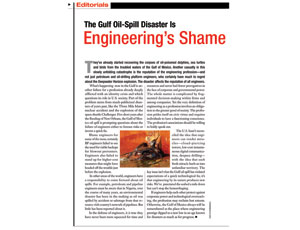Your editorial (“The Gulf Oil-Spill Disaster Is Engineering’s Shame,”) is an insult and assault on the engineering profession. ENR should retract the editorial because it misplaces responsibility, cites an honorable profession as something far less than deserved, makes an outlandish connection between disasters such as Three Mile Island, the Challenger, Hurricane Katrina and the BP Oil Spill and the engineering profession as a whole. It also indicts a profession with only a slight mention of what the engineering profession has contributed to the world’s society. Your lame point that somehow “engineers have to help each other protect against corporate power and technological overreaching” does not mention all the other professions involved in each decision that led to the disasters you have singled out. What is their responsibility?

It is a fact that you cannot turn in any direction or look at any other profession without seeing the benefits that engineers have contributed to society. The technological world we need to survive on this planet only exists through the contributions of engineers. As a magazine for engineers, you have failed your customers and owe them an apology.
I am sickened by your editorial on the Gulf disaster. Why do you “‘aim the shame” toward engineers? How about BP for saving a little money and taking the “tiny” risk of destroying the Gulf of Mexico and negatively affecting millions of lives?
Some of that criticism [of engineers] will prove to be justified in both the private and public sectors as a result of too many engineers viewing themselves as mostly or only employees—and often unlicensed ones at that. No other profession gives the kind of responsibilities “we” do to unlicensed practitioners.
Engineers determine the success or failure of most of our infrastructure, such as offshore oil wells, automobiles, flood- control systems and bridges. All have been negatively newsworthy in recent months and years. Partly as a result of the industrial exemption, too many engineers fly under the radar in terms of maintaining competence, being fully aware of the consequences of what they do and taking a stand on questionable technical and nontechnical decisions. They also fail to offer an enlightened example for young people considering various professions.
The editorial makes a strong case for the engineering profession to step up and meet its obligations to U.S. society. The way to do it is with pre-professional collegiate study as the foundation for further education, experience and credentialing through licensure and specialty certification. Many practitioners and educators, myself included, have advocated for elevated educational and credentialing standards in engineering. In civil engineering, for example, the American Society of Civil Engineer’s Policy Statement 465, Academic Prerequisites for Licensure & Professional Practice, supports the concept of the master’s degree or equivalent for the practice of civil engineering. ASCE is also advocating more structured practical experience prior to licensure. While such standards alone will not solve the problem on the seabed in the Gulf, our goal is to prepare tomorrow’s engineer to successfully deal with the broader, more complex challenges confronting our society.
There is no difference in the scenario played out in the Gulf and a host of other significant engineering disasters, such as the Challenger and Columbia fiascoes. The common cloth is prevention. Since prevention is an outcome, not a service, effective prevention cannot be given by authority as a duty. The assumption of outcome responsibility is welded to autonomy—the freedom to make whatever choices gets the prevention job done.
What is seldom appreciated is that once management, technologically illiterate, intervenes and changes the design, it owns the consequences. In responsibility taken there can be no override of authority nor a continued designer responsibility for outcomes. Ethics has nothing to do with it.
Yes, the very definition of engineering as a profession involves an obligation to the greater good of society, but that obligation for outcome must always be attended by the autonomy to develop the knowledge and intelligence requisite to make appropriate design choices (foresight). Following rules (hindsight) doesn’t cut it. Never did.
Is Engineering News-Record a supporter—or critic—of its primary constituency? If a critic, what credentials and authority entitle ENR to claim its higher moral ground? To proclaim that the Gulf oil spill is “another failure for a profession that’s deeply afflicted” is, at the very least, highly irresponsible and a poke in the eye for your readers. For any disaster of this magnitude, there’s always plenty of blame to go around.
With its charter of service to engineering, it is irresponsible for ENR to take what is happening in the Gulf as creating a legacy of failure in our profession. Deep sea oil exploration,...

Post a comment to this article
Report Abusive Comment